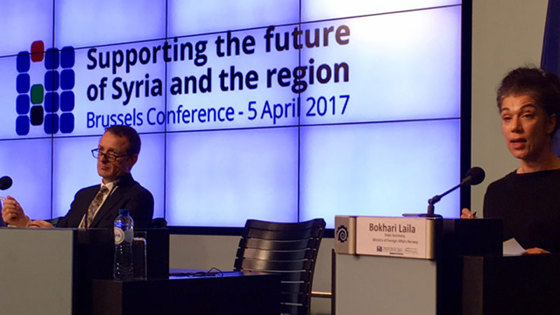Innlegg på Syria-konferanse
Historisk arkiv
Publisert under: Regjeringen Solberg
Utgiver: Utenriksdepartementet
Tale/innlegg | Dato: 04.04.2017
Av: Tidligere statssekretær Laila Bokhari (Brussel, 4. april)
Statssekretær Laila Bokharis innledning under sidearrangementet: «How to apply the Grand Bargain commitments to support Syrians» under Syria-konferansen i Brussel 4. april.
Check against delivery
Excellences,
Ladies and
Gentlemen,
Let me begin by thanking the ECHO for hosting this timely side event.
In order to improve delivery of humanitarian aid to the Syrian crisis response, it is important to discuss how donors, humanitarian aid organizations and UN agencies can better coordinate and streamline our efforts.

At the World Humanitarian Summit in Istanbul, many donors and aid agencies committed to better serve people in need through the Grand Bargain. Our goal is to make humanitarian assistance more efficient and effective.
As a top donor to the Syrian crisis response, and a committed supporter of the Grand Bargain principles, Norway stresses the importance of translating these commitments into concrete actions for the Syria humanitarian crisis response.
I would like to highlight three focus areas in particular, which challenge donors and implementing partners alike towards improving our humanitarian response.
Increased flexible financing
First, one of the Grand Bargain commitments is that donors should reduce earmarking and provide more flexible financing. This will enable aid organizations to more easily direct the delivery of protection and humanitarian assistance to the most vulnerable. This is particularly relevant in Syria, where few donors have direct access and must rely on aid organizations who either directly, or through local partners, are closer to the beneficiaries. It is also important to enable our humanitarian partners to change their programming based on rapid changes on ground. This requires our partners to be able to turn around quickly. And we, as donors, have to trust our partners in a complex political and humanitarian landscape and give them this flexibility. This is not always easy and certainly presents some dilemmas, but we cannot shy away from discussing them.
Increased multi-year financing
Secondly, more multi-year financing provides more predictability and flexibility for aid organizations. It will also help reduce administrative costs. More multiyear financing will require more collaborative multi-year planning. It also challenges us all to work towards strengthening the engagement between humanitarian and development actors. Between short-term and long-term responses. Between emergency assistance and resilience building. The conflict in Syria is approaching its seventh year and Syrians need not only survive, but envision a future for themselves and their families. This is why Norway made a four-year pledge in London last year, and remains dedicated to fulfilling our commitment.
Increased cash based programming
Thirdly, part of the bargain is that we must scale up and improve the coordination of cash based programming. This is of course contingent upon good and reliable market analyses by qualified actors. Cash based programming done right, ensures the dignity of aid recipients. It also reduces unnecessary costs for aid organizations and stimulates the local economy. Norway has recognized the potential and value of cash based assistance and works to promote this. This is no doubt a challenge inside Syria, but we need to discuss its potentials and risks.
Finally, let me pay tribute to the Syrian humanitarian actors present here today that risk their lives to help their fellow brothers and sisters. You are truly humanitarian heroes. I would also like to share my gratitude to international NGOs and UN agencies for their tireless efforts in assisting people in need in Syria.